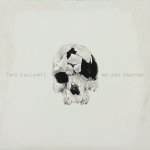Two Gallants got their start around the turn of the century, busking at the 16th and Mission BART station in San Francisco. A decade and a half later, that neighborhood, which is ground zero for the gentrification that is reshaping the entire Bay Area, has completely changed. Wealthy, young tech workers have replaced the artists, musicians and Latino families of Two Gallants’ heyday. On their new album, We Are Undone, the band struggles with the transformation taking place in their hometown. Fans at New York’s Mercury Lounge struggled with the band’s musical transformation.

There are three basic types of Two Gallants songs: 1) the (usually) fingerpicked, folk-punk songs that predominate on the band’s first three albums; 2) the aggressive, grunge-style songs that appear throughout the band’s discography; and 3) the new, bluesy, riff-driven songs of We Are Undone. At the band’s sold out show at the Mercury Lounge in Manhattan’s Lower East Side, a neighborhood that fought and lost the battle against gentrification decades ago. It was clear that the crowd overwhelmingly preferred the first type. During a set that spanned Two Gallants’ five albums, the audience responded most enthusiastically to the songs from 2006’s What the Toll Tells and 2007’s Two Gallants. The crowd was much more indifferent toward the songs from the band’s more recent albums. This was unfortunate as Two Gallants’ main virtues: a lyrical tendency to empathize with the downtrodden, a musical bent toward shifting tempos, and emotional intensity are consistent throughout their catalogue and were in abundance throughout their set at the Mercury Lounge.
Indeed two of the highlights of the set were the bluesy “We Are Undone” which directly addresses the gentrification crisis in San Francisco with lyrics such as “Father, has the marketplace done us any good?” and the slow, mournful, and beautiful “My Man Go,” both of which are from the new album. After a set that towards the end leaned heavily on 2012’s The Bloom and the Blight and this year’s We Are Undone, the audience seemed to have lost their enthusiasm. On one hand they can be forgiven for preferring the familiarity of the band’s mid-2000s albums, but it is disappointing to see an audience that is not willing to follow the band’s evolution.
Change is inevitable and one is compelled to remember Heraclitus’s maxim that a man cannot step in the same river twice. While it is difficult to find any positivity in the changes that have afflicted Two Gallants’ hometown, it is virtually impossible to begrudge a band that is attempting to grow and develop artistically. I’m hoping that the band’s fan base will soon demonstrate the willingness to adapt that the band has shown.
– Chris Alarie







Be the first to comment!